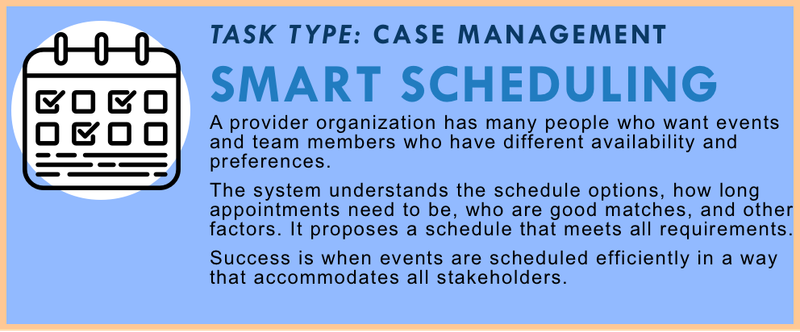Smart Scheduling

Schedule meetings and events by balancing team availability, participant needs, and logistical constraints.
Task Description
Legal help and justice organizations often need to schedule complex events—legal clinics, client appointments, workshops, working group meetings, or multi-party interviews. These events involve multiple people with competing schedules, roles, time zones, and preferences. Manual coordination is slow, error-prone, and a frequent source of delays or drop-offs.
This task involves a system that serves as an intelligent scheduling coordinator. It gathers key parameters—available time slots, event durations, staff roles, client availability, language needs, and preferences—and proposes a schedule that satisfies all constraints. It automatically suggests optimal time windows, proposes matches between clients and staff, and highlights any trade-offs or conflicts.
The system works dynamically: as people’s availability changes or constraints shift, it adjusts. It can prioritize continuity (e.g., assigning the same person to a client), reduce fragmentation (e.g., batch appointments), and adapt to policies (e.g., no weekend events, or prioritize first-available counselor). It can also send confirmations and reminders to reduce no-shows.
This task is particularly useful for busy clinics, hybrid service models, outreach events, or organizations managing many types of schedules (court dates, consultations, follow-ups). It improves operational efficiency and reduces staff time spent on calendar wrangling.
Success means that appointments are set efficiently, equitably, and reliably—meeting the needs of all parties while reducing burden on administrators.
How to Measure Quality?
🧠 Scheduling Intelligence
- Correctly interprets duration needs, availability, blackout dates, and working hours
- Assigns appropriate team members based on skills, roles, or past connections
- Avoids double-bookings, mismatches, or gaps in coverage
⚖️ Stakeholder Accommodation
- Balances provider and client availability, with fallback options
- Supports user preferences (e.g., time of day, interpreter needs, virtual/in-person)
- Suggests alternative times when ideal slots are unavailable
🔄 Efficiency and Flexibility
- Minimizes time between request and confirmation
- Adjusts schedules dynamically based on cancellations or rescheduling
- Suggests batch/group scheduling when beneficial (e.g., multiple tenants in a clinic)
💬 Communication and Follow-Through
- Sends clear confirmations, reminders, and instructions to all participants
- Integrates with calendar tools or case management systems
- Tracks attendance and flags repeated no-shows or scheduling conflicts
📈 Scalability and Workflow Fit
- Handles scheduling across different event types, programs, or staff levels
- Allows bulk scheduling and rule-based automation (e.g., “Every Friday at 2pm with a Spanish speaker”)
- Staff can override or manually adjust final schedules easily
🧑💼 Transparency and Review Tools
- Shows why a match or time was chosen (e.g., “best overlap of availability”)
- Allows easy manual edits or drag-and-drop adjustments
- Supports role-based permissions and visibility (e.g., only admins can reschedule team-wide meetings)